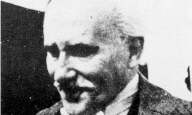

He was an orchestra director, born in Parma in Borgo Rodolfo Tanzi, on 25 March 1867 and died in Riverdale near New York on 16 January 1957. Claudio and Paola Montani were Arturo Toscanini's parents; his father was a tailor, choir singer and also a strong follower of Garibaldi; he followed this hero as soon as the possibility arose; The young Toscanini spent most of his childhood with his grandparents. He had already acquired a love for music at the age of 11 and he obtained a free place in Professor Carini's violoncello school at the conservatory of Parma.In 1884 he played in the "Lohengrin" and his school friends had already nick-named him "genius" (but also "scissors" due to his sharp sense of critisism); in 1885 he left the conservatory with a diploma distinguishing himself by gaining excellent marks: the school library still preserves three of his orchestra scores and a romance to be sung and played by piano. The year after it was at St.Paolo del Brasile and at Rio where he played in Claudio Bianchi's orchestra: contested by the orchestral director Miguez, Toscanini got onto the podium and was a triumph with "Aida", "Rigoletto", "Trovatore" and "Faust".
The public was overwhelmed and the emperor of Brazil sent him a precious gift. He returned to Italy in 1887 to play the viloncello in the orchestra at the first performance of "Otello" at the Scala, but he soon returned to the podium: in 1892 to direct "Wally" and "I Pagliacci" at Milano and "Cristoforo Colombo" at Genova (after having studied the opera in just one night); in 1895 at Torino he directed "Tristano" and"Il crepuscolo degli dei". He moved on to the Scala as the concert director and in 1896 he went to Torino and directed "Boheme" and also to the Metropolitan at New York with "Fanciulla del West" (interpreted by Caruso).
In 1898 he became artistical director and the principal 'maestro' at the Scala, but also Torino called him to direct 43 concerts, with a very vast repertoire as part of the international Exposition from May to October. On 26 February 1902, for the transfer of Verdi's and Strepponi's coffins, he directed 900 voices in the choir who sang "Va pensiero", which hadn't appeared in the Scala for twenty years. The year after at Buenos Aires: he battled hard until the dancing was removed during the representations and he didn't want anyone to ask for encores. He returned to Torino in 1905, with "Sigfrido" and in 1906 with "Salomè". From 1908 to 1914 he directed the Metropolitan and his repertoire enriched; in 1913 he directed "Flastaff" and "Traviata" in the small theatre at Busseto for Verdi's centenary celebrations.
The war broke out and Toscanini became an interventionist: he convinced himself to go on the front line with a military band. In 1918 he played for charity again during the war and in 1920 he conducted an Italian orchestra on a concert tour in the United States. On his return, the independant company of the "Teatro alla Scala di Milano" was born. After a year of organized work, he presented "Falstaff", "Boris Gudinov", "Mefistofele" with Pertile, "Debora e Jaele" of Pizzetti and "Belfagor" of Respighi. "Il Nerone di Boito" made a cash intake of 827 thousand lire.
Then Toscanini went to Swizerland with the Scala's orchestra and with the same orchestra proceded to Vienna and Berlin; then he returned to the United States leading the New York Filarmonic orchestra with which he came to Europe in May 1930. The university of Georgetown awarded him the degree "Honoris causa". When the war ended, the Scala re-called him, after the reconstruction of the theatre which had been semi-destructed by bombardments: he directed the third act of the "Manon" and the prologue of the "Mefistofele", the "Nabucco" and "Te deum" choir: He then dedicated himself to the revision and re-ordering of all his works and he died in 1957.